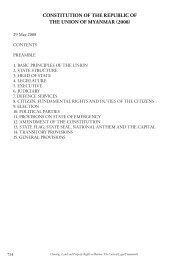Myanmar at the HLP Crossroads: - Displacement Solutions
Myanmar at the HLP Crossroads: - Displacement Solutions
Myanmar at the HLP Crossroads: - Displacement Solutions
You also want an ePaper? Increase the reach of your titles
YUMPU automatically turns print PDFs into web optimized ePapers that Google loves.
<strong>Myanmar</strong> <strong>at</strong> <strong>the</strong> <strong>HLP</strong> <strong>Crossroads</strong> 30as general administr<strong>at</strong>ive procedures, including, <strong>the</strong> timeframe for registr<strong>at</strong>ion, <strong>the</strong> appearance of requiredwitnesses to registr<strong>at</strong>ion, relevant fees and penalties for non-registr<strong>at</strong>ion.In 1921, a series of laws rel<strong>at</strong>ing to <strong>the</strong> <strong>the</strong>n capital city, Rangoon, were approved. The first of <strong>the</strong>se, <strong>the</strong> RangoonDevelopment Trust Act (1921), cre<strong>at</strong>ed <strong>the</strong> Trustees for <strong>the</strong> Development of <strong>the</strong> City of Rangoon (The Board).The Board includes represent<strong>at</strong>ives from <strong>the</strong> N<strong>at</strong>ional Housing and Town and Country Planning Board, <strong>the</strong> port ofRangoon, <strong>the</strong> Municipal Corpor<strong>at</strong>ion of <strong>the</strong> City of Rangoon as well as represent<strong>at</strong>ives appointed by <strong>the</strong> Presidentof Rangoon. The powers and duties of <strong>the</strong> Board (subject to <strong>the</strong> control of <strong>the</strong> President) include undertakingworks, <strong>the</strong> improvement, expansion and development of <strong>the</strong> City and <strong>the</strong> ability to purchase and hold immovableproperty. The Act extends <strong>the</strong> applic<strong>at</strong>ion of <strong>the</strong> Land Acquisition Act so th<strong>at</strong> <strong>the</strong> President (on behalf of <strong>the</strong>Board) is empowered to acquire land for <strong>the</strong> purposes of <strong>the</strong> Act. The Act was augmented one year l<strong>at</strong>er by <strong>the</strong>City of Rangoon Municipal Act (1922) which provides for rules and procedures rel<strong>at</strong>ed to municipal issues of<strong>the</strong> City of Rangoon. The duty of carrying out <strong>the</strong> provisions of <strong>the</strong> Act was vested in <strong>the</strong> Municipal Corpor<strong>at</strong>ionof <strong>the</strong> City of Rangoon (The Corpor<strong>at</strong>ion). The Act provides for <strong>the</strong> constitution of <strong>the</strong> Corpor<strong>at</strong>ion and providesfor relevant powers and duties, including, for example, w<strong>at</strong>er-works, registr<strong>at</strong>ion of births and de<strong>at</strong>hs, vaccin<strong>at</strong>ion,markets, lodging houses and public parks. The Corpor<strong>at</strong>ion is also vested with discretionary duties, includingm<strong>at</strong>ernity homes and schools (with certain limit<strong>at</strong>ions).St<strong>at</strong>e powers to control <strong>the</strong> <strong>HLP</strong> sector were fur<strong>the</strong>r increased under <strong>the</strong> Cantonments (House Accommod<strong>at</strong>ion)Act (1923) which provides for St<strong>at</strong>e appropri<strong>at</strong>ion of houses situ<strong>at</strong>ed in cantonments. Under <strong>the</strong> Act, <strong>the</strong>President has <strong>the</strong> power to declare <strong>the</strong> Act oper<strong>at</strong>ive in any cantonment or part of any cantonment, wherebyevery house situ<strong>at</strong>ed in such oper<strong>at</strong>ive cantonment is liable to appropri<strong>at</strong>ion by <strong>the</strong> Government. Where a militaryofficer st<strong>at</strong>es th<strong>at</strong> he is unable to secure suitable accommod<strong>at</strong>ion for himself or his mess and where no suitablehouse belonging to Government is available, <strong>the</strong> Act provides for st<strong>at</strong>e appropri<strong>at</strong>ion of housing. The Act regul<strong>at</strong>es<strong>the</strong> procedure and rules in such cases, including, vac<strong>at</strong>ion of <strong>the</strong> house, liability for repairs to <strong>the</strong> house, <strong>the</strong>required notice to be served, <strong>the</strong> annual rent to be paid and <strong>the</strong> option to sell <strong>the</strong> house to <strong>the</strong> st<strong>at</strong>e.In 1934, Burma became a separ<strong>at</strong>e colony of Britain. Between 1931 and 1941, <strong>the</strong> colonial government initi<strong>at</strong>eda combined British and Burmese Land Committee th<strong>at</strong> was primarily concerned with allevi<strong>at</strong>ing rural povertythrough land reform measures. Its st<strong>at</strong>ed goals were to slow down <strong>the</strong> r<strong>at</strong>e of land alien<strong>at</strong>ion to absentee landlords,readjust tenancy laws and redistribute family-sized plots to farming households. The Land Purchase Act(1941) empowered <strong>the</strong> Government to purchase large, non-agricultural blocks <strong>at</strong> market prices for redistributionas family-sized plots to rural farming households. The Land Alien<strong>at</strong>ion Act (1941) was intended to reduce <strong>the</strong>speed of land alien<strong>at</strong>ion by absentee landlords.Following <strong>the</strong> conclusion of <strong>the</strong> Second World War, <strong>the</strong> Custodian of Movable Property Act (1945) was passedin order to provide for <strong>the</strong> recovery and return to owners of movable property th<strong>at</strong> was confisc<strong>at</strong>ed from <strong>the</strong>mduring <strong>the</strong> war. The Act provided for <strong>the</strong> appointment of a Custodian of confisc<strong>at</strong>ed property and provided:“where owing to circumstances arising out of <strong>the</strong> war an owner of movable property relinquished possession<strong>the</strong>reof within <strong>the</strong> Union of Burma, it shall be presumed, until <strong>the</strong> contrary is proved, th<strong>at</strong> he has continued to be<strong>the</strong> owner of such property and th<strong>at</strong> he has had no intention of abandoning <strong>the</strong> same or any rights <strong>the</strong>reto”.The Act has clear importance in cre<strong>at</strong>ing precedence for any eventual <strong>HLP</strong> restitution programme. The Actfur<strong>the</strong>r provides th<strong>at</strong> no proceedings (civil or criminal) would be instituted: “in respect of any movable propertypossession of which was relinquished by <strong>the</strong> owner <strong>the</strong>reof owing to circumstances arising out of <strong>the</strong> war againstany person who has come into possession of th<strong>at</strong> property if such person delivers up such property to <strong>the</strong> owneror to a Custodian within such [prescribed] period”.In 1947, <strong>the</strong> final two pieces of <strong>HLP</strong> legisl<strong>at</strong>ion were adopted under colonial rule. The Public Property ProtectionAct (1947) governed <strong>the</strong> law rel<strong>at</strong>ing to public property (including property belonging to <strong>the</strong> armed forces).The Act specifically cre<strong>at</strong>ed an oblig<strong>at</strong>ion on persons who find abandoned or lost public property to not tamperwith and to report <strong>the</strong> finding of such property. Under <strong>the</strong> Act, <strong>the</strong> burden of proving authorised use of any publicproperty is on <strong>the</strong> person using <strong>the</strong> property. The Requisitioning (Emergency Provisions) Act (1947) providedfor <strong>the</strong> requisition of land and premises in certain circumstances. Specifically, <strong>the</strong> President, where necessary orexpedient, was empowered to requisition land and premises for a public servant whose work connected with <strong>the</strong>Government. With this l<strong>at</strong>ter Act, <strong>the</strong> pre-independence <strong>HLP</strong> law-making process came to a close.













